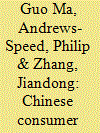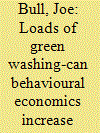| Srl | Item |
| 1 |
ID:
121315


|
|
|
|
|
| Publication |
2013.
|
| Summary/Abstract |
Energy saving is now an important component of China's energy policy. This paper reports the findings of a survey carried out in 2009 and 2010 of 246 citizens at different locations in the municipality of Chongqing in order to reveal information about attitudes towards energy and energy saving in the context of household electrical appliances. This study shows that citizens in Chongqing receive relatively little information and guidance on how to save energy in the home and that their stated level of knowledge on this subject is also rather limited. Respondents showed some willingness to save energy as long as this did not reduce their comfort and convenience, and they appeared likely to respond to economic incentives, such as high electricity prices or discounts on appliances. But they seemed to be unaware of the potential for information to help them save energy. The survey also demonstrated a high degree of heterogeneity across society with respect to sources of information and trust in those sources and with respect to attitudes to energy saving at home. These results show that the government needs to substantially adjust its strategies for promoting household energy saving.
|
|
|
|
|
|
|
|
|
|
|
|
|
|
|
|
| 2 |
ID:
116710


|
|
|
|
|
| Publication |
2012.
|
| Summary/Abstract |
The EU energy efficiency labelling scheme has successfully increased demand for efficient appliances by providing a prominent letter rating to consumers during their product search. Behavioural economics (BE) suggests the adoption of efficient appliances could be accelerated further by: (i) monetising efficiency, (ii) directly communicating the link between efficiency and carbon emissions, (iii) communicating the long-term (e.g., operational life) financial and environmental impact of product choices, and, (iv) framing the information as avoided losses ('extra') rather than gains ('savings'). This study tested these hypotheses via an online, stated preference survey of 465 UK residents using actual market pricing and efficiency data for washing machines. The provision of information about either running costs or running emissions did encourage selection of more expensive and efficient products (strongly correlated variables in the choice set and actual market) (p<.001, r=.30-.41) with no statistically significant difference between their impact. Providing lifetime running cost information also nudged respondents towards more expensive, efficient products than annual information (p=.006-.027, r=.15-.18). Finally, loss-framed running emissions information encouraged selection of more expensive, efficient products than gain-framed information (p<.05, r=.13-.16). The EU label is an impracticable means of communication, but digital communication channels (e.g., price comparison websites) may offer potential for inexpensive localisation and personalisation of the information. The results suggest that successful communication could benefit the private sector whilst making a contribution to reducing carbon emissions.
|
|
|
|
|
|
|
|
|
|
|
|
|
|
|
|
| 3 |
ID:
150021


|
|
|
|
|
| Summary/Abstract |
The paper projects households' stock of four major electricity consuming appliances till 2030 and explores policy options to accelerate adoption of more energy efficient appliances. India's rapid economic growth has enabled the growing middle class to buy household appliances in increasing numbers. The consequent rise in energy consumption and GHG emissions can be significantly reduced if consumers are motivated by awareness and options in the market to buy energy efficient appliances. India has introduced a star rating scheme for appliances, and even without incentives consumers purchase star-rated appliances. The stock of household appliances is projected using the data of a national sample survey of household consumption, observed sale of star-rated appliances and projected consumption distribution.
|
|
|
|
|
|
|
|
|
|
|
|
|
|
|
|
| 4 |
ID:
094226


|
|
|